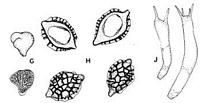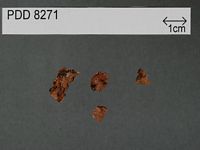|
 Timgrovea reticulata Timgrovea reticulata
SynonymsHymenogaster reticulatus
BiostatusPresent in region - Indigenous. Non endemic
Images (click to enlarge)
Caption: Hymenogaster reticulatus: G habit and section (Beaton 12) x 1;
H spores x 1750; J basidia x 1000. | 
Caption: Dried type specimen
Owner: Herb PDD |
Article: Beaton, G.W.; Pegler, D.N.; Young, T.W.K. (1985). Gasteroid Basidiomycota of Victoria State, Australia. 3. Cortinariales. Kew Bulletin 40(1): 167–204.
Description: Gasterocarp 10-15 mm diam., subglobose, pyriform
or lobed, basally attached. Peridium dingy white when fresh acquiring yellowish
tints on drying, smooth, dry and glabrous. Gleba greyish orange, drying light
brown (M.1.5YR/4.8/5.5), loculate, with irregular, empty chambers, 1-3 per mm.
Tramal plates up to 300 µm thick, consisting of a broad, hyaline, hymenophoral
trama and well developed subhymenial layers; clamp-connexions present on all
hyphae. Sterile base very small, white.
Spores 12.5-17.5 x 8-9.5 (15 ± 1.0 x 9 ±
0.5) µm (excl. orn.), Q = 1.67; broadly limoniform with a prominent mucronate
apex, golden brown to fuscous, with a thickened wall (-1 µm) and a reticulate
exosporial ornamentation (-1.5 µm high) overlaid by a loose, hyaline, disrupting
myxosporium. Basidia 30-50 x 5-8 µm, elongate cylindrico-clavate, bearing mostly
four, sometimes two sterigmata; also numerous short ellipsoid immature basidia
present. Hymenophoral trama regular, hyaline, of parallel hyphae, 3-18 µm diam.
Subhymenial layer well developed, 10-16 µm wide, pseudoparenchymatous. Peridiopellis
a thin epicutis of repent, loosely woven, non-agglutinated hyphae, 2-4.5 µm
diam.
Notes: Hymenogaster reticulatus was originally described from South Australia, but was also reported
from Tasmania (Cunningham 1944: 53). It is closely related to H. macrosporus
but is easily distinguished by the much smaller spores and the presence of tetrasporic
basidia. Hymenogaster subtropicus Cribb, from Queensland, also belongs
in this group with reticulately ornamented spores but has a bluish green peridium
and smaller spores.
It is interesting to speculate on the possible
origin of the reticulate-spored species of Hymenogaster, for such a pattern
of ornamentation is not found elsewhere in the Cortinariales but is reminiscent
of that found in certain species of the bolete genus Austroboletus (Corner)
Wolfe, of which several species extend into Australasia.
|